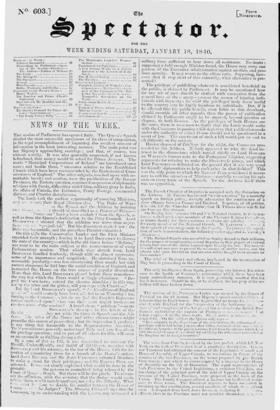NEWS OF THE WEEK.
distress, and Chartist disturbences.
The Lords took the earliest cmortunity of annoying Ministers, MA. sVc their Royal Mistress also. The Duke of WEL- !, • • t)a the and the .Address by insisting
Mt Pt o .7. r shonld ne described as a Proit-stod Prince-
.... Protestant" havieg beet exclude .1 from the Speech, as.
well as from the Queen's declaration to the Privy Council. Lord llirmanotNn r-otested that the addition was worse than super- fluon ,—it 'ea, "prejudicial." But his discontent availed not : the Duke was inexorable, and the powerless Premier submitted.
On this trifle the Conservative Leader ond the First Mialster
expended their strength ; leaving it to Lord Baor(otAm to discuss the state of the.country—which in the old times before "Reform," was wont to be the main subject at the commencement of every Parliamentary session. That which they shrunk from, Lord BaoueutAt handled fearlessly, though with no 111111(14 oppressive sense of' its importance and magnitude. He abstained from un- seasonable jocularity—was less entertaining than usual; but with earnest eloquence he laid bare the social condition of England, and instructed the House on the true cattaes of popular discontent. More than this, Lord Bnoronma placed lmfbre them remedies— the very last which the Peers would NV' administer. "lie- pa;! the Corn-laws; extend the elective franchise ; in this way, imt by the sabre and the gibbet, will you cope with Chartism."
But for Lord lIttoncuAm's speech, " the Condition-of-England mould scarcely have becit to on Thursday ;
turnino to the. Commous; what do we find the People's Represen-
tatives et 1111011 ? Wha t WitS their most urgent business On
th" or the session ? A brawl abotr " privilege--an at-
. STOCK DA dant:Igo:: in the hands of the . . :hey set aside the Quce:I's Speech tma the Ad- die.:. rules of the House and other circumstances might
prescribe this course of proceeding ; but the impression it produces is any thing but favourable to the Representative Assembly. I lit it constituents generally understand little tool care leas about the privilege question; and to put oil all others for this, \ill seem as unseasonable as Pdtlling during a fire. By a vote Of 286 to 1 07, it was determined to summon the
Sheriffs Under-Sheriffs, and Bailiff of Middhesex. toi!ether with Sroes.o.‘ f.ti and his attorney, to the bar of the House, svith the in- tention of committing them fbr a breach of the llonse's orders. Lord Joirl lItsitr,r, and Sir Jonx CAmenEr.s. exhorted Members to make a eland fur their privileges,. and Sir RonEnT PEur. ac- quiesced. it woe not clearly explained what would be done in the
probable 'the persons so committed being released by the Court of Queee's Bench. But there will be the pinch. To recom- mit the ofFenders, with the certainty that the Judge, would neolin release them, woeld merely continue, not s..)1.,se the (lin:culiy. Vu hot tlfm twist tIone to decide the conflict bet 0t.'2!1 1 ■I(I 11')Use ui COM111-' he Judges? The Afornir ,;;t■ s that the Luelto.us, by an understanding with the Loom, may coetiettud a military force sufficient to bear down all resistance. No doubt : supposing it bold enough Minister found, the House may array one portion of the Executive administration against another, aml pro- duce anarchy. It may resort to the eltima ratio. Supposing, how- ever, that it stop short of this extremity, what alternative is pre- sented I'
The privilege of publishing whatever is considered beneficial te the public, is claimed by Parliament. It may be questioned how iltr any set of men should be clothed with exemption front the ocneral laws of the cf_untry—possess the means of injuring indi- „.
\ideals with imptriity ; fin. what the privileged body deem useful to the country may be highly injurious to individuals. But, if it be allowed that the public benefit, even liable to this drawback, sliould override all other regards, then the power of publication claimed by Parliament ought to be secured, beyond question or dispute, to both :Rouses. AS the privileges of both Houses are the snow, there is no reason to doubt that the Lords would unite with the Commons in passing a bill declering that publication made under the authority of either I louse shimld not be questioned in a court of law. The enactment of such a bill would put an end to all difficulty on the sultject. 'laving disposed of Privilege fin. the night, the Commons pro- ceeded to the Address. Nobody appeared to take the least in- ' Wrest ill the discussion ; which turned chiefly on Lord IlowARD to: WaLnEN's ihmous note to the Portuguese Minister, sirs.mesting arguments for refusing to make the Slave-trade piracy, anTwhich Lord PALmensToN defended on the ground that it was very usual for friendly diplomatists to help each other in that fashion! This v,ets the only point to which Sir llotima Pion, considered it neces- sary to call the attenticm of' Ministers--carefullv receiving his opi- nion on every topic of the Speech. To the Address itself there was no opposition.


























